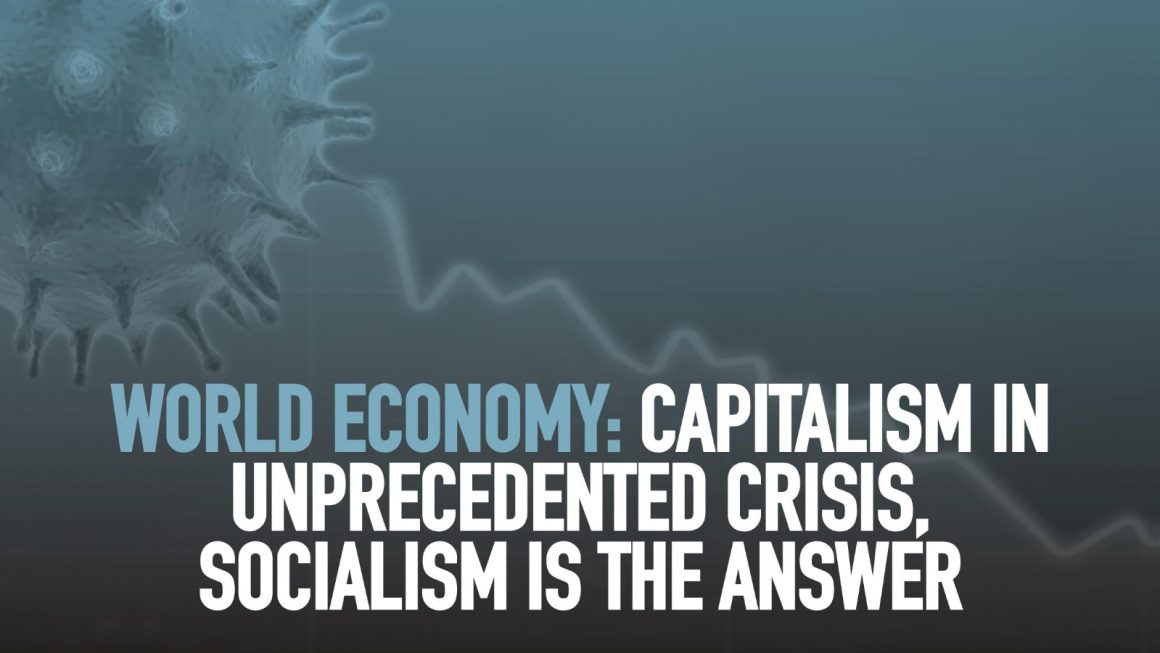By John Hird (Socialismo Revolucionario — our sister organsiation in Spanish State)
The recent avalanche of articles reporting the pronouncements of the pillars of capitalist rule such as the IMF, World Bank and EU in the financial press regarding the economic and social consequences of the Covid-19 crisis, indicate we are at an important conjuncture. The extraordinary economic measures being taken by capitalism at the moment and what seems like a turn away from neoliberal norms will affect the balance of class forces and struggle and vice versa.
The economic crisis is serious. The IMF forecasts that global economic growth will be negative this year and the worst since the Great Depression of the 1930s. It expects the global economy to experience a 4.4% contraction in 2020, a 0.8% improvement on its June estimate.
But by the end of 2021, advanced economies are likely to be 4.7% smaller than the IMF expected at the start of this year before the pandemic struck, with emerging economies taking an 8.1% hit.
The social consequences are incredible. The International Labour Organization estimates the world will lose working hours equivalent to 245 million full-time jobs in the final quarter of this year. Many small businesses closed during the shutdown; many more have found after reopening that they are no longer viable.
The International Air Transport Association, which represents 290 carriers globally, says it doesn’t see passenger traffic recovering until at least 2024. Global airlines, including Lufthansa and Cathay Pacific, have cut more than 400,000 jobs already. American Airlines and United Airlines began furloughing tens of thousands more as government aid expired this month.
Nearly 80% of US job losses were classified as temporary in April, and 8.5 per cent as permanent. By September, this had changed to 35% and 30% respectively, with the rest being those whose temporary jobs ended.
According to September jobs data, 2.4 million Americans are considered long-term unemployed, that is out of work for at least 27 weeks, with nearly 5 million more set to join them over the next two months.
Coronavirus has led to economic disruption on a scale not seen since the second world war. Economic institution after institution are announcing that, as was the case after 1945, state investment is necessary to rebuild economies and provide jobs. The IMF has made it clear that premature fiscal tightening, in other words a continuation of business as usual austerity, in the aftermath of the crisis will harm, not heal, economies.
“The death of austerity should not be mourned”
A recent Financial Times (FT) headline said: “The death of austerity should not be mourned. Governments must spend wisely to rebuild their economies”. Fiscal deficits have ballooned since the pandemic struck, with global public debt set to reach 100% of gross domestic product in 2020 to counter the effects of COVID-19, and the IMF is supporting these policies. Its advice in October was that, where possible, governments should continue to spend until the virus is “finally behind us and recoveries are entrenched”.
Even countries renowned for frugality, such as Germany, are spending big. Borrowing has rarely been as cheap.
The FT reports that monetary policymakers, with a few exceptions, are onside. Jay Powell, who as chair of the US Federal Reserve is the most powerful central banker in the world, has become fiscal cheerleader-in-chief, urging Congress to spend more to sustain the recovery. His counterparts in the UK and the Euroszone have made similar pronouncements — unthinkable 10 years ago.
What is going on?
Here is a selection of recent financial news and what they could mean in the struggle to establish a world socialist alternative to the chaos and misery of capitalism.
“Eurozone heads for €1tn deficit amid efforts to control pandemic”
(FT -20th October 2020)
Christine Lagarde, president of the ECB, said monetary policy and fiscal support have to remain in place for “as long as necessary”. This means Eurozone governments will go further into the red than ever before in 2020 to pay for the COVID-19 crisis. This is a reversal of former tight budgetary controls.
Officials at the IMF and World Bank have also shifted from calling for austerity to urging countries to throw caution to the wind by borrowing heavily to tackle the fallout from the pandemic. “First you worry about fighting the war, then you figure out how to pay for it,” said Carmen Reinhart, chief economist at the World Bank.
Marco Valli, chief European economist at UniCredit, said that governments had to “keep spending all that’s needed to support their economies and reduce . . . long-term damage”.
There are various contradictions in the situation in which capitalism finds itself at the moment. Clearly, the penny has dropped that they need to spend their way out of this crisis and the former neoliberal misers are now urging a running up of debt. Before the COVID-19 crisis some economists and institutions had already lost faith in the neoliberal set of policies as they were not delivering for capitalism and the present situation has only exacerbated that process. The new unstable factor for capitalism is the rising global class anger at how governments have handled the health crisis.
It would be a ‘brave’ or foolhardy government now which called for cuts in their health service. Look at the reaction in the UK to the callous ‘Starve a million kids’ at Christmas policy of the Johnson government.
This COVID-19 crisis has brought us sharply to a conjuncture which is characterised by capitalism’s fundamental need for restructuring of one kind or another in order to maintain itself. However, this restructuring is not solely dependent on what the capitalists decide is best for them and their system, using their theoretical economic models and calculations. The change in consciousness amongst the working class of the world, which has taken place at lightning speed over the last six months, feeds into the calculations of the capitalist class and affects their decisions.
The fundamental contradictions of the system remain, and the spending today will have to be paid for tomorrow if the present capitalist system remains. Pensions are a case in point.
Billions at risk of pandemic squeeze on retirement pots
(FT -20th October 2020)
“The economic recession caused by the global health crisis has led to reduced pension contributions, lower returns and higher government debt in most countries,” said Dr David Knox, senior partner at Mercer, the actuarial firm, and lead author of the Global Pension Index study. “Inevitably this will impact future pensions, meaning some people will have to work longer, while others have to settle for a lower standard of living in retirement.”
Governments will have scant room for manoeuvre to support their older populations, either through pensions or provision of other services, such as healthcare, because of Covid-19-related debt.
“The significant growth in government debt during 2020 will, at some future date, affect the ability to pay benefits from pay-as-you-go systems and provide ‘social protection’ programmes,” said the report.
This is in a context where working class people are seething with anger at how in many countries older people have been sacrificed due to underfunding of health and residential care and in the case of Spain, where owners of privatised homes literally left COVID-19 victims to die.
In essence capitalism is offering a future to the older generation of ‘work until you drop and live in poverty in the meantime.’ Capitalism has its own dynamics and contradictions and to economists the idea of impoverishing the pensioners seems ‘logical’ and necessary but the pensioners will have other ideas. Even before the COVID-19 crisis pensioners in Spain were mobilising weekly in their thousands and linking up with the youth to demand decent pensions and a dignified retirement. We can expect more struggles of a similar nature around the world in this new period.
The week that austerity was officially buried (FT -17th October 2020)
Stern warnings to reduce deficits after the financial crisis led to a decade of budget cuts as governments struggled to balance their books. But now they are being urged to spend their way out of the pandemic.
In the middle of October, 2020 it seems Europe’s economy is sliding towards a double-dip recession, with economists warning that rising coronavirus infections and fresh government restrictions on people’s movement are likely to cut short the region’s recent recovery. The solution being advocated is to spend, spend, spend.
Carmen Reinhart was an advocate of austerity in 2010 but the World Bank’s chief economist now backs more spending. Kristalina Georgieva, head of the IMF, has also encouraged countries to borrow.
Austerity’s funeral has been declared. Those who used to worship at its altar now urge countries to throw caution to the wind. Fiscal orthodoxy, practised over decades since the debt crises and inflation of the 1970s and 1980s, has been replaced with fiscal activism.
Both advanced economies and many emerging ones have keenly taken the advice to heart as they have battled coronavirus. The IMF estimates that countries have increased spending or cut taxes by $11.7tn so far — 12 per cent of global gross domestic product in 2020. To put this in perspective, just over a decade ago and after months of bickering, the G20 nations finally agreed a stimulus worth 2 per cent of global GDP for two years after the financial crisis.
At the time of the 2008–09 crisis, the Toronto G20 summit declaration in 2010 highlighted “the importance of sustainable public finances” and warned that “countries with serious fiscal challenges need to accelerate the pace of consolidation”. Greece, for example, by that time had already lost the confidence of its lenders. For the working class of Greece that meant ruination and planned and enforced poverty and in the rest of Europe and many parts of the world swingeing and brutal cuts to public services, the consequences of which we are suffering today in the COVID-19 health crisis.
Austerity not inevitable to restore public finances to health, says IMF
Deficits soaring in crisis
Big economies free to borrow
Reversal of advice a decade ago
(FT -15th October 2020)
The FT reports that the IMF’s words will be seized on in the US and across Europe as giving the green light for countries to invest out of the recession, rather than tightening their belts as they did in the previous decade.
According to the FT the IMF’s tolerance of debt today marks the final nail in the coffin for the doctrine of austerity. However, the FT also points out that the grip that it held on economic ideology had long been loosening.
The IMF itself acknowledged as early as 2013 that some elements of its prescription for Greece, which saw its GDP contract by 25 per cent, was too harsh. Typical of financial commentators that the havoc they wreaked on the Greek economy and the misery they caused is ‘regretted’ almost 10 years after the events.
Why has capitalist economic thinking changed so radically? Firstly, the experience that austerity and neoliberal policies were not delivering for capitalism even before COVID-19. Secondly, the radically changed circumstances brought about by the pandemic and finally ‘politics’ as the financial commentators put it. Or in other words, fear of the backlash and of provoking mass movements amongst the working class.
The FT puts it like this: “There is no longer any desire for austerity after the difficult 2010s, so the political and public mood fits with the new economics. Arguably, austerity sowed the seeds of its own destruction by raising support for populist politicians in Donald Trump and Boris Johnson who had no truck with difficult budgetary issues and rarely saw any problem with public spending largesse.”
In the UK, Boris Johnson’s Conservative government has ruled out austerity in words as the way to resolve the nation’s public finance difficulties and, even in Germany, the bastion of fiscal probity, politicians such as economy minister Peter Altmaier now boast about introducing “the biggest stimulus programme of all time” in response to coronavirus.
Economics, ideology and the politics of class struggle
Here we see the interconnection between economics, ideology and the politics of class struggle. During the recession decade, austerity was presented as a sort of flu which we would inevitably get and just have to suffer. Now that humanity has had to cope with a more virulent virus these lies have been exposed. How many times have we heard that countries like the UK have ‘the greatest health service in the world’? Or that private health coverage and privatisation of public services are ‘liberal’ and ‘progressive’? These ideas are now seen as sick jokes due to the bitter experience of COVID-19.
In the UK, the Institute for Fiscal Studies warns that the crisis is likely to require higher health and social care spending in the future, far in excess of any benefit from lower borrowing costs. It said the UK would ultimately need to find tax rises of probably around 2 per cent of GDP to limit a likely persistent rise in public debt.
The question of funding for health services and who pays for it will in most cases be decided through public pressure and ultimately the class struggle.
Already, workers in France, Belgium and Spain are mobilising and striking for well funded health services with wide public support. On October 27th, doctors in Spain called their first strike in 25 years with 85% support. These struggles are likely to widen and deepen as time goes by.
Damned if they do and damned if they don’t
IMF warns of lasting pain from Covid-19. Living standards expected to take big hit and whole sectors to be left unviable
(FT -15th October 2020)
As new statistics emerge everyday on the depth of the economic crisis, economists are swinging from one mood to another. They urge spending their way out of the crisis then lament the consequences up the road.
The IMF predicts the coronavirus crisis will wreak lasting damage on living standards across the world, and consequently taxes on the rich and on companies will have to rise to address the situation.
A report by Gita Gopinath, the fund’s chief economist, said the period of recovery from the crisis would be “long, uneven and uncertain”.
“The persistent output losses imply a major setback to living standards relative to what was expected before the pandemic,” Ms Gopinath said. “Not only will the incidence of extreme poverty rise for the first time in over two decades, but inequality is set to increase.”
Women and less-skilled workers are likely to be the worst affected. Ms Gopinath said that in the coming years governments might need to tax richer people more and ensure companies could not avoid corporate taxation.
“Although adopting new revenue measures during the crisis will be difficult, governments may need to consider raising progressive taxes on more affluent individuals and those relatively less affected by the crisis — including increasing tax rates on higher-income brackets, high-end property, capital gains and wealth,” the report said.
Possible rise of ‘authoritarian neoliberalism’
Activists in the labour movement are understandably concerned about the rise of the ultra right during the austerity years and whether they can again take advantage of the volatile situation, given the absence of strong left wing parties. Political economists and academics have suggested a form of ‘authoritarian neoliberalism’ is possible.
However, it seems in the short term the rise of the right is being cut across by the COVID-19 crisis. The FT times carried a headline in October:
Europe far-right weakened by infighting and rise of rivals. Pandemic lifts governing parties while voters worry less about immigration
(FT -15th October 2020)
In the municipal elections in Vienna, Austria’s right-wing Freedom party’s, (FPO) share of the vote collapsed from 31 to 9 per cent. “This time it wasn’t other parties that defeated us: the FPO did our opponents’ work for them,” the leader Herbert Kickl told supporters.
Right wing populists have also declined strikingly in Germany, where the rightwing Alternative for Germany (AfD) has descended into civil war. Last month, two AfD parliamentary groups imploded in chaos.
Latest polls put the AfD at 9 per cent, down from 13 per cent at the last national election in 2017, when it emerged as the biggest opposition party in the Bundestag. Kai Arzheimer, a political scientist at Mainz university, said the feuding had turned off voters, “as has the realisation of how many extremists there are in the AfD”.
In Greece, almost all the leaders of the fascist Golden Dawn were jailed for operating a criminal gang. ISA in Greece played a prominent part in the campaign against Golden Dawn.
In Spain the far-right VOX party failed miserably in their vote of confidence against the PSOE-Unidos PODEMOS coalition and are increasingly seen as marginal and crazy for their support for anti-mask and conspiracy theory movements. Their tiny percentage increase in a recent opinion poll was at the expense of the PP, which indicates there is a radicalisation to the right.
After the vote of confidence the coalition presented its budget and the vice-PM and leader of PODEMOS, Pablo Iglesias declared it was, “a strengthening of labour and social rights and the requiem for the long hegemony of the ‘neo-liberal’ stage”. It remains to be seen what actual labour and social rights are really on offer, but the fact a government is declaring the end of austerity and neo-liberalism is significant. During the COVID-19 crisis and after, support for investment in public services, especially health, new infrastructure and even nationalisations of firms under threat of closure will be the order of the day. The sterile, blame the immigrants and cut back the state discourse of VOX is not likely to make more headway at the moment amongst the mass of the working class but could then win support from the firm supporters of the PP in an increasingly polarised society.
In Bolivia, the masses overturned the coup against Morales by resisting through mobilisations and eventually in elections. This is despite Morales and MAS not having a clear and determined perspective and programme for socialist transformation.
Socialists should avoid having a too economic determinist approach. While it is true there is a lack of strong left formations based on the working class at the moment, the consciousness of the vast majority is for action to defend jobs and rights, taxing of the rich and for well-funded health and public services.
There is also a growing class anger at how the elites have handled the pandemic crisis.
When the financial commentators say that ‘public opinion’ demands state spending and the abandonment of austerity it is for concrete reasons — they feel the pressure of society.
Socialists need to try and understand and get a feel for the multiplicity of contradictions in this specific conjunctural moment. What are the possibilities for working class struggle in this new period? Even without strong left parties various layers of society have been moving into activity. The incredible world-wide women’s movement, BLM which struck like lightening around the world at injustice and the youth campaigning against climate change are just three examples. What are these movements if not the first waves of the masses searching for vehicles to bring about fundamental change?
The far right may be having temporary setbacks but no doubt they will regroup, but any gains they make will provoke a counter reaction and movements, especially in countries like Spain where the question of fascism or socialism has been posed sharply in the state’s recent past historically.
The previously unthinkable
Capitalism is facing an unprecedented crisis. Economically, politically and ideologically. They are being forced to change economic course and contemplate the previously unthinkable because of an unforeseen catastrophe. COVID-19 has exposed all the contradictions of capitalism in a stark way. We exist in a world of undreamed-of wealth, advanced technology and endless possibilities yet the rulers cannot or in some cases will not marshal the resources to protect humanity.
COVID-19 is a truly international phenomenon and has exposed inequalities not just between the rich and poor within individual countries but also between countries and regions. The least developed countries have poorer health systems and conditions and have been less able to deal with the pandemic and the poor have suffered greatly. Yet there are contradictions as well. The USA has had one of the highest number of COVID-19 cases and deaths in the world because it has among the poorest average health standards of the major developed economies. Life expectancy is lower in the USA than it was seven years ago.
The planet is in danger and collective action is essential to save it, yet capitalist competition and growing divisions between rich and poor are massive obstacles and in fact are increasing the possibilities of more environmental and public health disasters, as the COVID-19 crisis has shown.
Politics and ideology are not simple tools which can be manipulated at will by the ruling class. The hollow phrases at the beginning of the pandemic, that we are all in it together will not be forgotten easily, neither will being told for a decade that we were to blame for austerity for ‘wanting decent wages and good public services’ as the rich got away with paying their taxes and hiding billions away in fiscal paradises.
The concrete analysis of concrete conditions
An economic collapse of capitalism is in no sense inevitable, nor by any means will it come from a contradiction at the economic level alone. The present period of extreme economic uncertainty for capitalism as reflected above in the financial press, as they search for ways to save their system presents tremendous opportunities for socialists to build a strong alternative.
Increased state investment and spending will change the political landscape. How far capitalism abandons the neoliberal road is not purely an ideological economic decision for capitalism. For the working class, the appetite will grow with eating. The need for well-funded health services will be a given in the next period but it can also depend on how hard the organised working class pushes back and demands more. If we can have well-funded health services, why not education, dignified pensions and full employment and decent wages?
Part of the neoliberal project has been to weaken the collective strength of the working class and restrictions on the right to strike and organise do indeed exist in many countries. However, the basic organisations of the working class are still intact and in fact the working class is larger than ever. Former middle-class professions like teachers, doctors and civil servants are now firmly in the camp of the working class and use working class forms of struggle and organisation such as unions, the picket line and strikes. New layers are also moving into action such as the gig economy workers and women who have gone into the unions to demand action and strikes on women’s rights.
Society is a living organism in a constant state of development and change. Socialists need to analyse all aspects, including the economy objectively. Clearly, all the evidence suggests capitalism is facing a crisis of identity as the COVID-19 crisis and events force it to look for alternative ways to operate.
The opponents of Socialism imagine that the Marxist method, or dialectics, is a preconceived scheme, into the pattern of which everything is supposed to fit. This is the very opposite of the truth about dialectics. The employment of the Marxist dialectical method does not mean that we apply a preconceived scheme and try to make everything fit into it. No, it means that we study things as they really are, in their real interconnection and movement. “The most essential thing in Marxism,” Lenin wrote, “is the concrete analysis of concrete conditions”.
The uncertain and constantly changing economic and political situation opening up in the world presents enormous opportunities to build a socialist alternative. Nothing is written in stone. We have a world to win!












